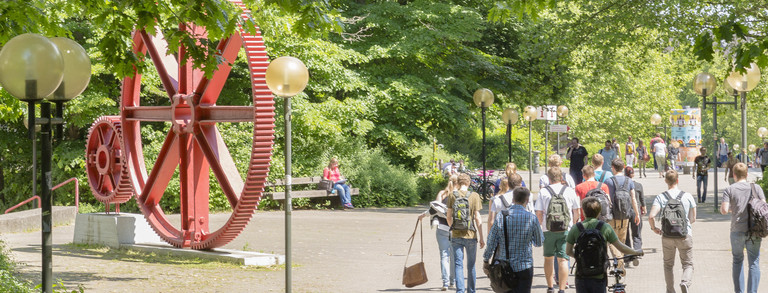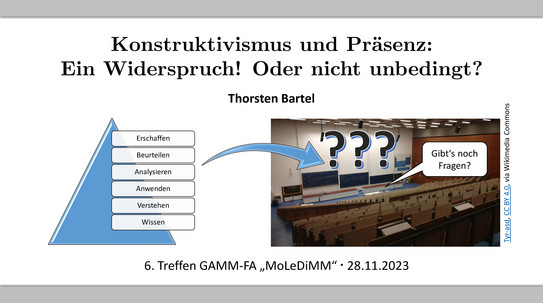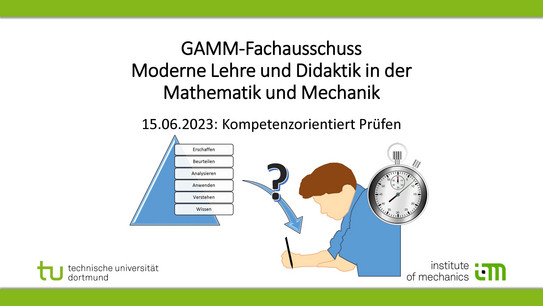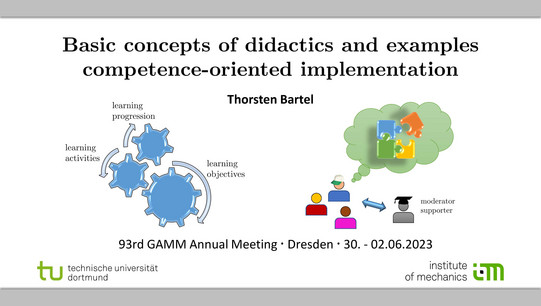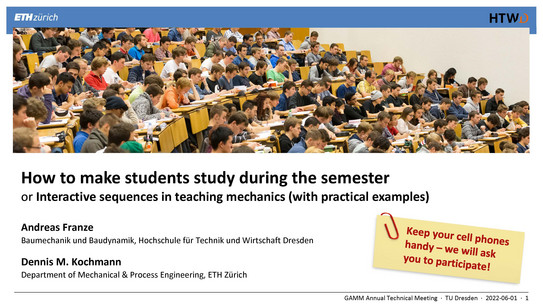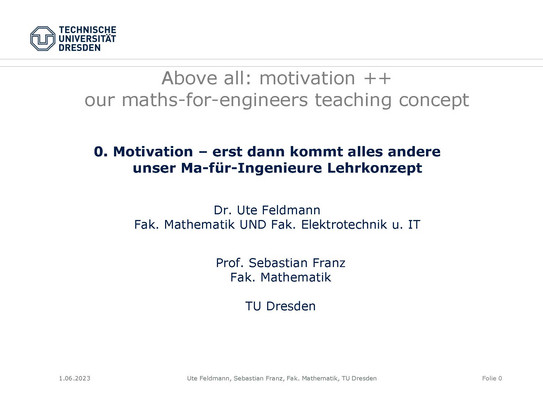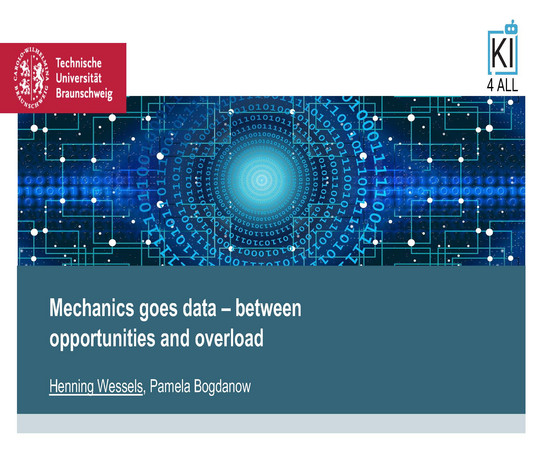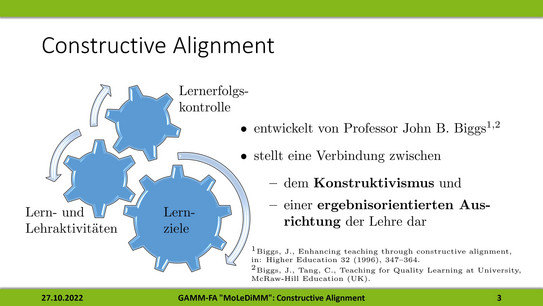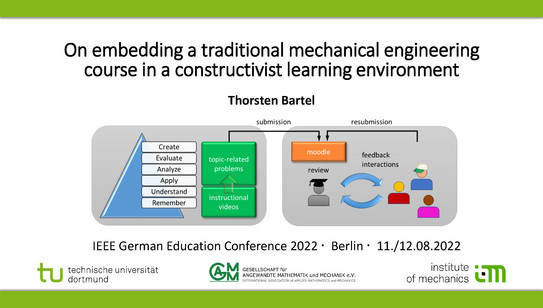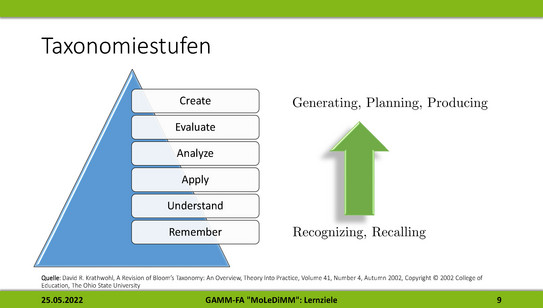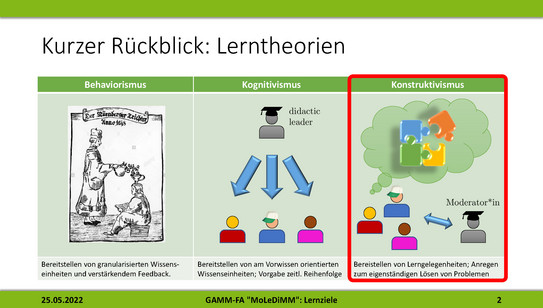Modern teaching and didactics in mathematics and mechanics
The Society for Applied Mathematics and Mechanics - GAMM for short - set up this new technical committee in August 2021. The initiators and coordinators are Dr.-Ing. Thorsten Bartel and Prof. Dr. Tobias Haertel.
Our motivation and goals
Now that we have established the state of research in the field of university didactics across all locations and thus also the basic associated concepts, our next goals are aimed at the concrete implementation of these methods, also and in particular in accordance with the OER (Open Educational Resources) concept. The long-term goal remains the definition of quality standards for competence-oriented teaching.
Latest news
- On September 30 and October 1, 2025, the workshop "Next Level Engineering Education: Serious Games as a driver of skills development" took place at the University of Kassel. Due to its great success, we will set up a "Serious Games" working group as part of the expert committee. In this group, we will continue to discuss this topic and collect and pursue joint ideas.
- Thanks to the cooperation with Dr. Maria Freese and Dipl. oec. Birgit Zürn, who led essential parts of this workshop, there is now a "natural" connection to SAGSAGA e. V., which we want to deepen in the future.
- At the same time, we are working on our publication in the GAMM book series LAMM - Lecture Notes in Applied Mathematics and Mechanics .
If you feel addressed by these points, we would be very pleased to hear from you via fa_didaktik@gamm.org.
Our activities and material
Material (general)
Workshop "Next Level Engineering Education", 30.09./01.10.2025, University of Kassel
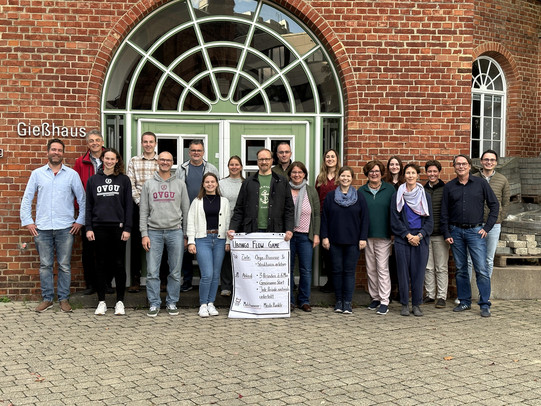
On 30.09. and 01.10.2025 we held the workshop "Next Level Engineering Education: Serious Games as a driver of competence development" at the University of Kassel. Especially with the support of Dr. Maria Freese and Dipl. oec. Birgit Zürn from SAGSAGA e. V., it quickly became clear to all participants how "Serious Games" can inspire university teaching. Due to the great success of this workshop, we will now set up a "Serious Games" working group in which we will continue to pursue this topic in the future.
We would also like to thank GAMM for their financial support, without which the workshop would certainly not have been nearly as successful.
Workshop "How Learning Works (Best)", 01./02.07.2025, TU Dortmund University

On July 1 and 2, 2025, we held the workshop "How Learning Works (Best)" exclusively for members of the DFG-funded Priority Program 2256 (SPP 2256). The event focused on the basics of learning from the perspective of psychology and the ideas derived from this for implementation in higher education.
The core points of the interactive workshop were, in particular, the findings from research in psychology (based on the book "Learning - Brain Research and the School of Life" by Manfred Spitzer), the correct classification/definition of the term "learning", the effect of (positive) emotions and the effects of learning, the effect of (positive) emotions on learning, a deeper understanding of terms and theories such as "Cognitive Load Theory" (according to Chandler and Sweller), "Zone of Proximal Development" (according to Vygotsky) and "Radical Constructivism" (according to van Glasersfeld) as well as current "good practice examples".
Quote from a participant:
I thought it was great that it wasn't just a series of lectures, but that it was very varied - with participants working on their own, exchanging ideas in small groups and discussions with everyone. [...] That's what I had hoped for in advance as the ultimate goal of the workshop, that at the end you have a set of concrete tools/concepts that you can then take out for the next event and say "Okay, I can do it this way and that way and I have to pay attention to that."
95th Conference of the International Association of Applied Mathematics and Mechanics (GAMM), Poznan (Poland), 07.-11.04.2025
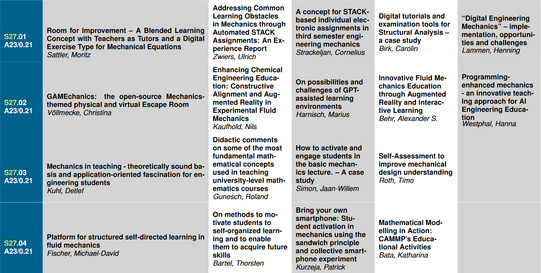
Thanks to our initiative and the support of the GAMM Executive Board, a new section has been created specifically on the topic of "Teaching and Didactics". This means that from the 2025 Annual Meeting in Poznan (Poland), papers specifically on this topic can now be submitted for the Annual Meetings in addition to the conventional research topics.
The first appearance of our new section at the GAMM conferences can only be considered a complete success: With a total of 18 contributions - including keynote lectures by Moritz Sattler (TU Munich), Christina Völlmecke (TU Berlin), Detlef Kuhl (University of Kassel) and Michael-David Fischer (TU Dortmund University) - in four almost fully occupied sessions, there was always great encouragement from the audience and purposeful and consistently interesting discussions.
5th symposium Transition Commission School - University (Hanover, 19.-21.02.2025)

The 5th symposium of the Commission of Transition from School to University dealt, among other things, with the question of how to make training in mathematics more motivating both at school and at university. We were invited to give a keynote speech on the role of mathematics in the service sector, particularly in engineering. We paid particular attention to problems that arise with the parallel or sometimes retrospective treatment of topics and the mostly lacking technical reference.
IFToMM YFG-MMS 2024

The Young Faculty Group of IFToMM (International Federation for the Promotion of Mechanism and Machine Science) hosted the first symposium on "Emerging Fields in Mechanism and Machine Science" from November 19 to 21, 2024. The organizers had invited us to contribute to "Teaching and Didactics" at this online conference, which we of course gladly accepted. The slides of our presentation entitled "On methods to motivate students to self-organized learning and to enable them to acquire future skills" can be viewed here:
Seventh meeting (27.08.2024)

The seventh meeting was all about progressive ideas for increasing motivation in teaching. Prof. Dr.-Ing. Christina Völlmecke presented her project "GAMEchanics - Mechanics meets Gamification", in which a physical and virtual escape room with puzzles from the field of mechanics was developed. Although the target group of the project is rather high school students and the general public, the "puzzles" and basic concepts can be easily adapted to study content.
Workshop "New approaches to teaching" (10/11/06/2024)
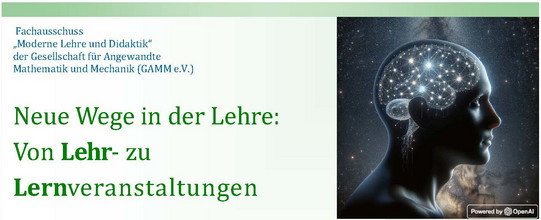
On June 10/11, 2024, the workshop "New ways in teaching: From teaching to learning events" took place at TU Dortmund University in the "Makerspace Engineering Education" of IngenieurDidaktik. After getting to know each other and the keynote lecture by Tobias Haertel, topics such as "student motivation", "competence orientation" and "AI in teaching" were discussed intensively. A short visual summary of the workshop can also be found in this video.
Once we have collected and sorted the material, we will make it available in the near future.
Many thanks to GAMM for their considerable financial support of the workshop.
Quote from a participant:
"I came to your workshop with no clear expectations, except maybe to get some ideas about how to use modern technologies in teaching. Instead, I understood for the first time what exactly should change in order to deliver effective teaching. [...] These concepts should be known to every teacher! I have now learned them and I am very grateful for that."
Sixth meeting (28.11.2023)
Main topics:
- The Python-based tool "mechpy" for the automatic and individualized generation of exercises in mechanics (additionally automatically correctable via STACK in moodle) - Benjamin Marussig (TU Graz)
- Good practice example for a motivating and competence-oriented classroom course "Technical Mechanics" - Thorsten Bartel (TU Dortmund University)
Fifth meeting (15.06.2023)
Main topic: Competence-oriented testing
Summary: Screencast
With the participation of our expert committee, GAMM experienced a novelty on its 100th anniversary: for the first time, a mini-symposium was dedicated solely to the topic of "Didactics and modern teaching". On the one hand, the aim was to explain the basic concepts of didactics to the audience. On the other hand, concrete implementations in the sense of "best practice" examples were presented. The speakers are listed below together with their abstracts and presentation slides.
- T. Bartel (TU Dortmund University): Abstract / Presentation
- D. Kochmann (ETH Zurich), A. Franze (HTW Dresden): Abstract / Presentation
- L. Burr (Ulm University): Abstract
- U. Feldmann, S. Franz (TU Dresden): Abstract / Presentation
- M.H. Gfrerer, B. Marussig, K. Maitz, M.M. Bangerl (TU Graz): Abstract
- H. Wessels (TU Braunschweig): Abstract / Presentation
Fourth meeting (27.10.2022)
Main topic: Constructive Alignment
Summary: Screencast
IEEE GeCon Berlin (11./12.08.2022)
Hybrid conference at the TU Berlin with the main topic "Teaching/learning concepts".
Presentation slides: PDF version / PPTX version
Related peer-reviewed publication: "On embedding a traditional mechanical engineering course in a constructivist learning environment"
Third meeting (25.05.2022)
Main topic: Learning objectives/learning outcomes, taxonomy levels
Summary: Screencast T. Bartel
Second meeting (08.02.2022)
Main topic: Learning theories
Good practice example: Prof. Dennis Kochmann (ETH Zurich) on the topics of "Peer Instruction" and "Flipped Classroom"
Summary of the meeting: Screencast T. Bartel
Summary of the presentation on learning theories: Screencast T. Haertel
First meeting (09.11.2021)
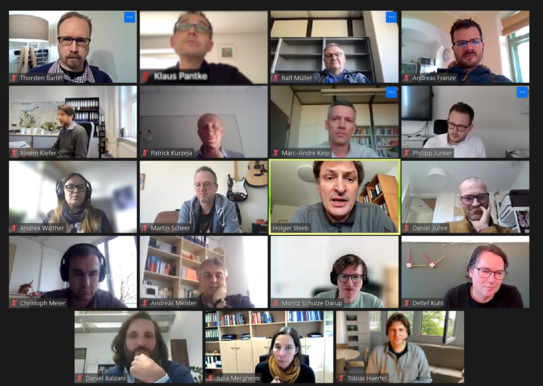
"Kick-off" meeting, definition of the objectives of the expert committee, agreement on the content and organization of the next meetings.
Summary: Screencast
If you are interested in the content of our expert committee, please feel free to contact us by e-mail. Participation in our regular meetings is possible and welcome at any time - you do not have to be a permanent member of the expert committee.
Contact
E-mail: fa_didaktik@gamm.org
Phone: +49 231 755 2668
Who we are
The expert committee was founded in August 2021 with the following members
Prof. Dr. Daniel Balzani (Ruhr University Bochum), Dr. Thorsten Bartel (TU Dortmund University), Prof. Dr. Timm Faulwasser (TU Hamburg), Prof. Dr. Andreas Franze (Dresden University of Applied Sciences and Arts), Prof. Dr. Daniel Juhre (OVG University Magdeburg), Prof. Dr. Philipp Junker (Leibniz University Hanover), Prof. Dr. Marc-André Keip (University of Stuttgart), Prof. Dr. Björn Kiefer (TU Freiberg), Prof. Dr. Dorothee Knees (University of Kassel), Prof. Dr. Dennis Kochmann (ETH Zurich), Prof. Dr. Detlef Kuhl (University of Kassel), Dr. Patrick Kurzeja (TU Dortmund University), Prof. Dr. Felix Lindner (University of Kassel), Dr.-Ing. Christoph Meier (TU Munich), Prof. Dr. Andreas Meister (University of Kassel), Prof. Dr. Julia Mergheim (TU Erlangen-Nuremberg), Prof. Dr. Ralf Müller (TU Kaiserslautern), Akad. Dir. Dr. Martin Scheer (TU Dortmund University), Prof. Dr. Moritz Schulze-Darup (TU Dortmund University), Prof. Dr. Andrea Walther (Humboldt-Universität zu Berlin)

